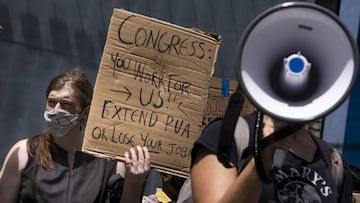Executive order: are the $400 US unemployment benefits taxable?
With the latest coronavirus relief package not being agreed to, President Trump signed an executive order to continue a reduced version of unemployment compensation.

As President Donald Trump signed the executive order to extend the unemployment benefits introduced in the CARES Act to support those affected by the coronavirus pandemic, questions were immediately raised about how it would work. One of those is whether or not the benefits are taxable.
What’s the FPUC?
Under the CARES Act, the Federal Pandemic Unemployment Compensation (FPUC) allowed for a payment of $600 per week on top of state benefit. Although the president has lauded his executively-enforced extension of these payments as “generous”, it is worth noting that the amount available is being reduced significantly, to just $400 per week.
- Trump signs executive order: what is included?
- Democrats quiet on legal bid to stem Trump's executive order
- Trump executive orders: is a second stimulus check coming?
- $400 unemployment benefits boost: when does it start?
- Trump executive orders: when do they come into effect?
Trump has also stated that 25% of this ($100) is to be covered by your state’s coffers, which could be a challenge in some areas of the country. New York Governor Andrew Cuomo, for example, has said that his state does not have the funds to contribute to a benefits boost, describing Trump's executive order as "impossible" adding that "the concept of saying to states 'you pay 25% of unemployment insurance' is just laughable."
Are new unemployment benefits taxable?
The simple answer is yes! These benefits are always seen by the Internal Revenue Services as a taxable income and are subject to federal taxes. There can also be state taxes due on them but this depends on an individual state’s requirements.
What do you need to do?
Despite being taxable, the tax on unemployment benefits is not necessarily taken off automatically. This means that you are responsible for making that happen early to avoid a painful sting when the April bill comes around.
You can complete Form W-4V when enrolling for your benefits and this will allow you to ask for the 10% flat rate to be held back. Note, however, that based on your total income, this rate may not be enough. The IRS have provided a handy calculator to help you work out if this applies to you.
Larry Kudlow acknowledged on CNN that it's not clear whether states have the money to provide 25% of the additional unemployment benefits ordered by Trump.
— Axios (@axios) August 9, 2020
"We'll probably find that out today or tomorrow as we make our canvas." https://t.co/9Y9CycQXI0
Your best bet is to check out the specific insurance program in your state and apply appropriately. You can find out all you need at the following website.
How long till new unemployment benefits available?
How quickly Americans can actually start to claim their additional $400 a week remains to be seen, however. According to the US constitution, Congress has control over how to spend federal government funds, not the president, so the implementation of the measure could well find itself delayed by legal challenges.
In a news conference on Friday, Trump said he was prepared for legal action, declaring: "You always get sued. Everything you do you get sued. But people feel that we can do it."
Echoing the words of Republican Senator Ben Sasse, Pelosi branded Trump's executive orders as "unconstitutional slop" in an interview with Fox News Sunday. However, US Treasury Secretary Steve Mnuchin - who was also involved in the failed relief-bill negotiations - warned Democrats against mounting a legal challenge.
Related stories
"We’ve cleared with the office of legal counsel all these actions," Mnuchin told Fox News Sunday. "If the Democrats want to challenge us in court and hold up unemployment benefits to those hardworking Americans that are out of a job because of Covid, they’re going to have a lot of explaining to do."
Meanwhile, Forbes also notes that states may take time to get their systems organized to start paying the $100 that Trump’s plan calls on them to contribute - if they can afford it at all.

